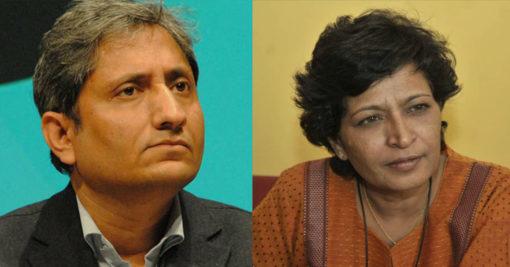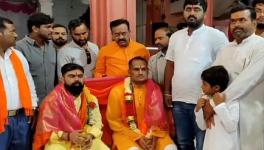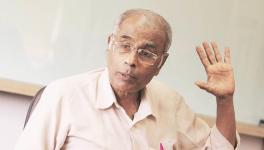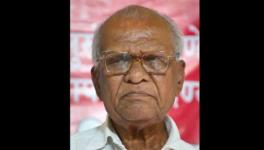The Gauri Lankesh Award: In the Name of a Feisty Journalist

Senior journalist and Magsaysay awardee, Ravish Kumar, received the Gauri Lankesh award on September 22, 2019. Accepting the award named after the journalist-activist who was a powerful voice against the communal politics of the Bharatiya Janata Party, Ravish delivered an incisive speech highlighting the communal character of the current government and reflecting upon the systematic attack on dissent in the country. He pointed out that the attack on dissent goes beyond the assault on universities and other liberal spaces, that it extends to the creation of docile citizens in the northern parts of the country by depriving them of critical education.
He began by saying: “All of you have assembled here in remembrance of a journalist. You do not know what you have done by just coming here. It is not about me getting this award; you are here to remember a journalist. I come fromthe north Indian region of the country. When Punya Prasun Bajpai was forced to leave his organisation, when Abhisar Sharma was compelled to quit, when Ajit Anjum was made to resign, no one came out in their support. No one spoke up. But you have come here. You have taken time out. The Hindispeaking community could not stand these Hindi journalists who were being critical of the government. You of all people need not be threatened by this enfeebled Hindi. The influence of anti-democratic forces has made Hindi speakers afraid of speaking up; Now the same forces want Kannada and Malayalam speakers too to be afraid of them. That is why they are imposing Hindi on all of you.”
These comments come clearly in the wake of Amit Shah's recent remarks about making Hindi the national language which received immense flak from the Southern states.
Ravish went on to point out that mainstream Hindi media houses, which have tremendous reach in the north Indian states, have all become mouthpieces of the government. He said he wondered why people would even bother to go and vote when their perceptions were so deeply coloured by this propaganda. These states, he stressed, also have very dismal socio-economic indicators, lagging significantly behind the rest of the country in areas like education. Absence of quality education meant that youth from these regions would either have to migrate to other states, or stay behind and be deprived of educational opportunities that train one to think critically.
Thus there is, Ravish says, a lack of a critical mass which would stand up against the media which is being blind towards their oppression. And this in turn has given impunity to the government to do whatever they want to and come out clean.
Gauri Lankesh belonged to that tradition of journalism which spared neither any political party nor any politician. Lankesh Patrike, a tabloid that P. Lankesh, her father, had started and which she later took over, believed in using the harshest language to criticise elected representatives. Both Gauri and her tabloid got into trouble many a times. In a couple of instances, she was physically attacked. Gauri strongly believed and advocated that governments had no role whatsoever in the work of journalists. So one can imagine what her views on the present state of media would have been.
In an article on The Wire, she had said, “with the number of 24X7 Kannada news channels increasing, things are becoming murkier. Needless to say, there is no dearth of local clones of Arnab Goswami. They are just as aggressive in shouting down participants with a different point of view, even more patriotic than the self proclaimed nationalist himself and are prone to exaggeration while ‘breaking news’ every minute of the day.” Reflecting upon the situation in the Hindi media, Ravish reiterated what Gauri had observed. He said that most of the Hindi News channels believe in an oppressive set up where the ‘truth’ has got no place unless and until it is in praise of the government.
In a sense, Ravish's speech echoed the words of known Kannada writer B. Shreepada Bhat, in his tribute to Gauri Lankesh in the commemorative edition of the Gauri Lankesh Patrike:
"It is today’s corrupt and fundamentalist society that has created the murderers of Gauri. This thought is disappointing and also scary. The fundamentalist groups that we considered to be part of the Sangh Parivar are functioning at the national level and causing bloodshed. The murder of Gauri Lankesh is an example of this development. Gauri was killed because we are being mere spectators of gender, caste, and religion-based discrimination. We might argue that, Gauri not accepting any form of police protection was the main reason for the murder; but the brutality of the minds that designed her murder has shocked us. We are part of a system that kills humanitarians like Gauri; sadists who celebrate her death; and opportunists who say that Gauri shouldn’t have been involved in the issues that she did; and a system with a fascist Prime Minister like Narendra Modi who chooses to remain silent. This system generates fear.”
Get the latest reports & analysis with people's perspective on Protests, movements & deep analytical videos, discussions of the current affairs in your Telegram app. Subscribe to NewsClick's Telegram channel & get Real-Time updates on stories, as they get published on our website.
























